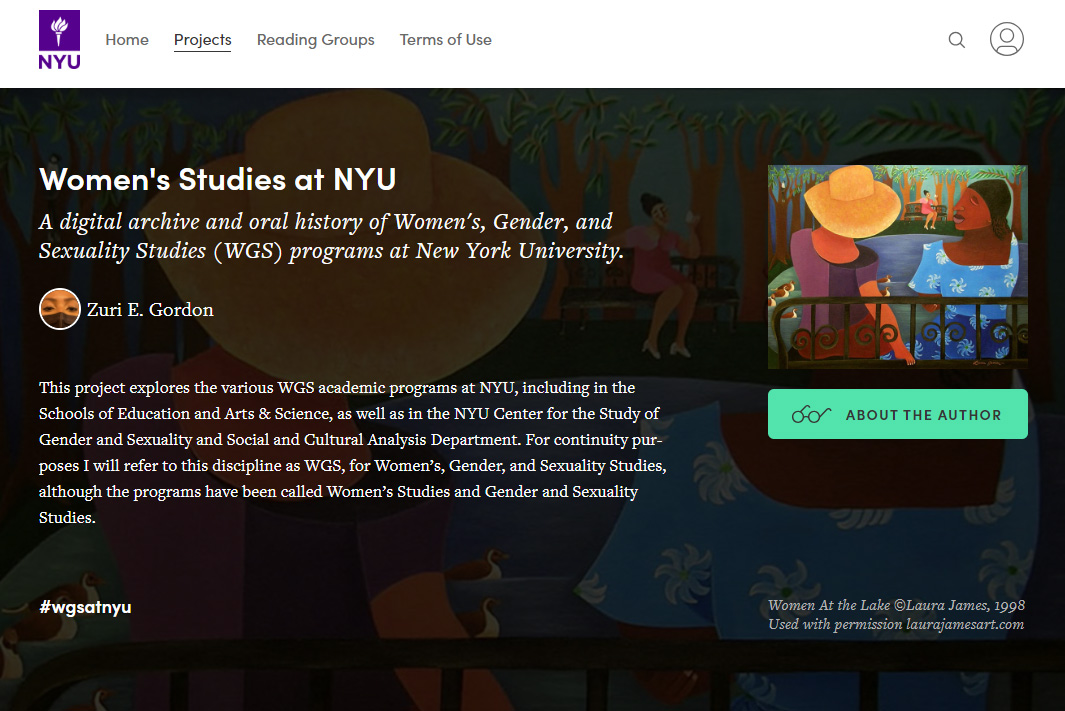For her MA in Higher Education and Student Affairs, Zuri Gordon created a digital publication on NYU Manifold to bring togther resources from NYU Special Collections with her own reflections. Women’s Studies at NYU provides a point of entry for public engagement with the history of these fields at NYU.

When asked what she was most proud of, Gordon remarked:
Z.G. I am so proud to share the stories, voices, and materials of people who have been involved in WGS at NYU! The institution has never had a dedicated WGS department, but there have always been feminist academics, administrators, and students doing important and necessary work here. It was a complete shock to me to learn that a few decades ago, there was a WGS program in the NYU school I am currently attending, or that students created a feminist journal with original work. Everyone I spoke to was so kind. Even in their responses to my email requests for interviews, I consistently got positive affirmations from them about my project, and interest in speaking with me. I hope it can reach more people who have been involved in this programming at NYU, and are interested in WGS as an academic discipline in general.
Gordon reflected on the skills that helped her project succeed.
Z.G. My instructors Professor James Fraser and University Archivist Janet Bunde gave me a great foundation in how to utilize the NYU Archives & Special Collections, and the staff in the Bobst Library and Digital Scholarship Services were helpful in acquiring reproductions, requesting books to be added to circulation, and creating my Manifold website. This was very much a labor of love; it was not a requirement for my degree, I have a full-time job, and I’m not even a History or WGS or Digital Humanities student. Despite that, I was motivated to complete it because I was learning so much and talking to fascinating people. My background in English/Creative Writing also helped to make my project accessible. About halfway through the project, I decided to revise everything I had already written to be more creative and personal. I wanted it to sound less like a research paper, because the project is also about me and my experience in the archives, and I wanted the reader to be along my journey.
We asked Zuri to share a bit about how she approached NYU Special Collections in her research and how she selected and incorporated items.
Z.G. Most of my research started with a simple “women’s studies” search on the NYU Special Collections & Archives website. Without knowing exactly what I would get, I requested almost everything that the search results turned up. During many appointments at the library over the course of the year, I examined course bulletins and masterlists, event posters, student work, conference pamphlets, press releases, interdepartmental communications, alumni letters, and more. I requested a lot of reproductions from the library and took even more of my own photos of any materials that interested me. I wanted each page of the site to include images of archival resources and access to longer reproductions, like articles from the feminist journal revolution/evolution or the entire proposal for the Women in the Human Services program. I compiled each essay with that intention, making sure to integrate library resources and quotes from my interviews with my own writing.
While Gordon’s project is complete, she welcomes contact from those interested in Women’s Studies at NYU.
Z.G. This project was a culmination of my work for an elective I took in Fall 2023 and continued as an independent study in Spring 2024 and I’ve since graduated. I would still love to hear from anyone who was involved in WGS at NYU, and continue to read and cite the work of the people I spoke to.
